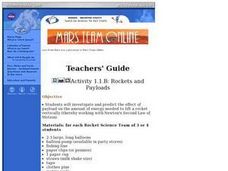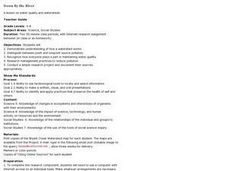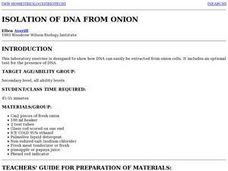Curated OER
Hypothesize This!
Students role play scientists to prove a hypotheses. They determine whether or not walruses stay warmer in water or in air. Students also determine in which environment they lose more body heat.
Curated OER
Watersheds, Watersheds Everywhere
Students identify the watershed in which their school is located. They use maps to locate their homes and school. They define and use the correct vocabulary.
Curated OER
Lightning
Students uncover the science behind lightning and thunder.Theyexamine electrical attraction between like and unlike charges, and the force that creates lightning, is first explained using static electricity.
Curated OER
Sun, Shadows, Surface Structure...and the Face on Mars
Students use light and shadow information to make inferences regarding the three dimensional shapes of specific objects photographed on the surface of Mars. Limitations of the of the data provided are discussed and entries made into the...
Curated OER
The Incredible Light Bulb-Egg Drop Challenge
Students examine how spacecraft land on Mars. Using eggs or lightbulbs, they design a craft that withstand a drop from a table or ladder, competing in groups to see which module demonstrates the most successful landing.
Curated OER
Be a Whale
Students explore the body shape, behavior and history of gray whales by creating origami whale hats. Students role-play whale behavior as they listen to a story.
Curated OER
Modeling Martian Motion
Students explore the difference between stars and planets and take on the role of these objects to simulate the relative motions of Mars and the Earth around the Sun.
Curated OER
Rockets and Payloads
Students investigate Newton's Second Law of Motion as they predict the effect of a payload on the amount of energy needed to lift a rocket vertically. The constraints of the weight of the equipment carried to Mars is compared to the...
Curated OER
Down By the River
Students examine how watersheds work and determine the difference between point and nonpoint source pollution. They research management practices to reduce pollution and investigate how everyone can participate in reducing water pollution.
Curated OER
What Is Your Explanation for the Evidence?
Students encounter an interactive computer program activity designed as a diagnostic of student beliefs related to the theory of evolution. Students process the Hypercard cascades structured around a set of biological topics related to...
Curated OER
ISOLATION OF DNA FROM ONION
Students perform a laboratory exercise designed to show how DNA can easily be extracted from onion cells. They conduct an optional test for the presence of DNA using standard lab equipment.
Curated OER
Chick Embryology
Students investigate techniques that can be used to observe the development of the chick embryo. They explore the environment in which the chick develops and how it can be manipulated.
Curated OER
Mutations--Preexisting or Acquired?
Students explore the reasoning and experimental approaches to mutations. They expose a culture of E. coli to virulent bacteriophage and observe whether mutations of the cells existed previously or if the bacteria mutated as a response...
Curated OER
Animals Abound
Students explore the world of mammals, birds, and fish to compare and contrast their habitats, adaptations, and camouflages. Through research, musical experiences, and hands-on activities, the lives and adventures of these animals are...
Baylor College
Plant Parts You Eat
Plants provide a variety of delicious foods essential for human survival. In the fourth lesson of this series on food science, young scientists investigate common fruits, vegetables, and grains in order to determine which plant part is...
Baylor College
Bio Build-up
Trace pollutants through the environment in the seventh lesson of this series on the science of food. Looking at a picture of the plants and animals in an aquatic ecosystem, learners use dot stickers to represent harmful chemicals as...
Baylor College
Healthy Snacks
Assess your pupils' ability to identify healthy food choices in the final lesson of this series on food science. Given five different food labels, young nutritionists will rank them from most to least healthy, supporting their choices...
Baylor College
Using Food Labels
Help your class make sense of nutrition labels with the ninth lesson of this series. After explaining the different information provided on packaged food labels, perform an activity that demonstrates the amount of sugar in a single can...
PBS
Blow the Roof Off!
Blow the minds of young scientists with this collection of inquiry-based investigations. Based on a series of eight videos, these "hands-on, minds-on" science lessons engage young learners in exploring a wide range of topics from making...
Henry Ford Museum
Sustainability: Environmental Management and Responsible Manufacturing
When you think about environmental sustainability, the Ford Motor Company probably isn't the first company to come to mind. A four-lesson unit introduces learners to the idea of sustainability and environmental stewardship. It describes...
Sunburst Visual Media
Clouds
Support science instruction with a combination of engaging activities and skills-based worksheets that focus on clouds. Learners take part in grand discussions, write an acrostic poem, complete graphic organizers, solve word puzzles, and...
Next Generation Science Storylines
Why Don't Antibiotics Work Like They Used To?
Bacteria get more resistant to antibiotics every year. Learn the reason for this pattern and how scientists are addressing the problem in a six-week unit. Learners analyze different types of bacteria and their adaptations.
Curated OER
Column Chromatography
Students research the mechanics of liquid chromatography. In this technology instructional activity, students calculate the concentration of unknown samples. They write a report about their research and lab results.
Curated OER
Science in Focus: Force and Motion
Learners explore force and motion through a series of experiments. In this physics lesson, students create and interpret speed graphs. They build an electromagnet and explain the factors affecting its strength.

























